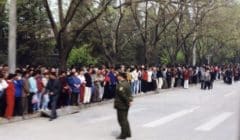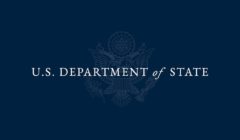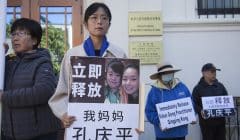Defense Cites ‘Over Policing’ by Hong Kong Authorities in Arrests of Falun Gong Practitioners During Peaceful Demonstration
Scholars See Clear Signs of Beijing Policy, Bending Rule of Law

"Over Policing?" Hong Kong police surrounded these peaceful demonstrators with iron fences, held a press conference, and then forcefully arrested them for 'obstructing the sidewalk,' defense says.
It is widely believed that the overbearing police action, in which police outnumbered protesters and formal arrest procedures were overlooked, was in response to requests by the Beijing Liaison office to remove the protesters to avoid embarrassment over the Mainland’s persecution of Falun Gong.
Defense Details ‘Unprofessional’ Police Behavior
On March 14, 2002, just before 9:00am, four Swiss practitioners of Falun Gong accompanied by local supporters began a peaceful demonstration outside the Chinese Government Liaison Office at 160 Connaught Road West in Hong Kong. Soon after, an official inside the Liaison office, in possession of a private phone number to senior ranking officers, phoned the Western Police Station to register a “complaint” about the protesters outside the building, according to a statement from defense attorney John Haynes on July 9.
Police quickly arrived in large numbers, surrounded the protesters with iron fences blocking off the main entranceway of the building, and initiated a press conference. Police then forcefully seized the protesters, employing violent means including squeezing pressure points and choking, according to eyewitnesses and video footage taped at the scene.
A scale drawing of the protest site shows the alleged “obstruction of sidewalk” did not, in fact, occur until police had erected the barriers and parked squad cars on the pavement. Before the police arrived, no passage was blocked.
Police have failed to provide witnesses or evidence to support their claim of “obstruction” in this case, and neither has the Liaison official who registered the complaint submitted any formal testimony or evidence.
Police Favor Founded in Fear of Beijing, Defense Says
“To discover the true factors precipitating the seizure of so many peaceful people of good character,” the defense statement reads, “the overall history and political background of this particular area of pavement must be carefully examined.”
Falun Gong was banned by the Mainland three years ago. Since that time Beijing has applied heavy pressure to Hong Kong to adopt its repressive policy against Falun Gong.
Protests and appeals by Falun Gong practitioners have been markedly peaceful in nature both inside China and abroad. The police and legislators in Hong Kong, however, have gradually shown signs of adopting Beijing’s oppressive stance on the practice during the last three years.
“When we look at all the details, from Tung Chee-hwa’s statements about Falun Gong using Jiang Zemin’s terms, to the instances of police disturbing peaceful rallies [8/25/01 and 10/11/01], to the denying entry to foreign travelers associated with Falun Gong [January 2001 and July 2002], we see a very clear pattern emerging,” commented Dr. Shiyu Zhou, professor at the University of Pennsylvania. “Hong Kong has taken disturbing steps away from its once-cherished rule of law, and has begun to adopt the policies of the [Mainland] totalitarian regime.”
Sophie Xiao, a spokeswoman for Falun Gong practitioners in Hong Kong, is hopeful for Hong Kong’s handling of this case. “We’re calling on [the SAR officials] to stand up for the principles that have made Hong Kong proud among the world community in the past. Jiang’s persecution of Falun Gong must and will end, and I hope Hong Kong will not bow to his agenda this time.”
“Falun Gong’s peaceful appeals have become a symbol of Hong Kong’s ‘one country, two systems’ policy, and a symbol of a free society,” Xiao continued. “The result of this trial will certainly affect Hong Kong’s own future.”






